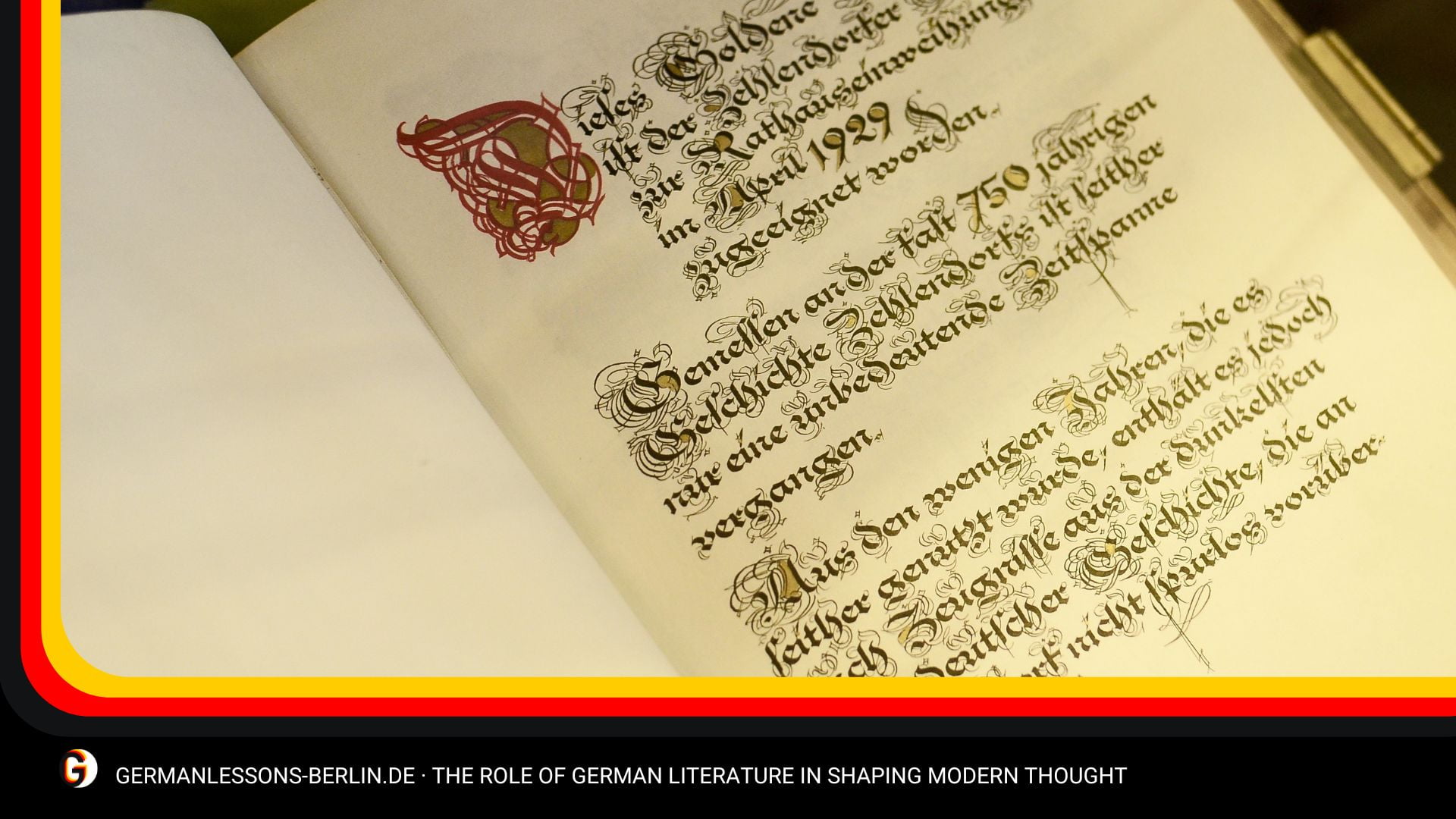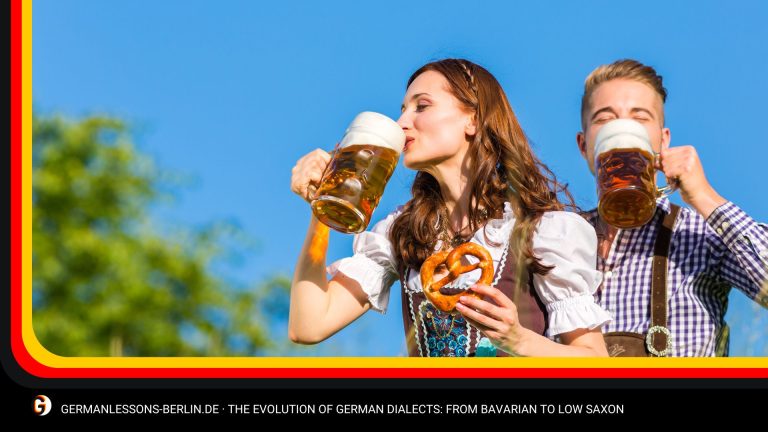Table of Contents
You’ve probably wondered how modern thought was shaped. Well, you’re about to discover the pivotal role German literature played in this. You’ll explore its historical context, delve into influential works, and see its impact on philosophy and psychology. You’ll even glimpse how it stirred political thought. German literature’s contribution is more significant than you’d thought, isn’t it? Let’s dive in and see just how it’s influenced the way we think today.
Key Takeaways
- German literature has evolved over the centuries, starting with religious texts in the Middle Ages and shifting towards questioning societal norms during the Enlightenment.
- Influential German authors like Goethe, Mann, Brecht, Hesse, and Kafka have left a lasting impact on literature with their masterpieces such as ‘Faust’, ‘The Magic Mountain’, ‘The Threepenny Opera’, ‘Steppenwolf’, and ‘The Metamorphosis’.
- German literature has played a significant role in shaping philosophy, including the introduction of existentialist thinking, enlightenment ideals, and the development of critical theory.
- German literature has also made contributions to modern psychology, influencing psychoanalysis, exploring existential crisis, informing trauma studies, and influencing therapy techniques. Additionally, German literature has been a platform for expressing political thoughts and advocating for social justice.
The Historical Context of German Literature
You can’t grasp the depth of German literature without delving into the historical context where it’s been shaped over hundreds of years. It’s a rich tapestry, woven with the threads of social change, political upheaval, and philosophical thought. The Middle Ages marked the beginning with religious texts, but the Enlightenment brought a shift. Literature became a tool for questioning and challenging societal norms. You’ve seen this in works like Goethe’s ‘Faust’, reflecting a struggle between desire and morality. The world wars also left an indelible mark, with authors using their words as protest and reflection. Now, with this historical foundation, we can move on to explore influential German authors and their works.
Influential German Authors and Their Works
While you’re exploring the landscape of German literature, it’s crucial that you delve into the works of influential authors, as they’ve had a profound impact on modern thought. These authors’ stories, ideas, and expressions have truly shaped intellectual discourse.
Here are some key figures and their notable works:
- Johann Wolfgang von Goethe: Known as Germany’s Shakespeare, his work “Faust” is a literary masterpiece.
- Thomas Mann: His novel “The Magic Mountain” is a profound exploration of the human condition.
- Bertolt Brecht: A leading figure in 20th-century theatre, Brecht’s “The Threepenny Opera” redefined dramaturgy.
- Hermann Hesse: His philosophical novel “Steppenwolf” continues to inspire readers worldwide.
- Franz Kafka: Though Czech by birth, Kafka wrote in German. His work “The Metamorphosis” is a pillar of modern literature.
Enjoy this journey into the minds of these literary giants!
The Impact of German Literature on Philosophy
In this section, we’ll uncover how German literature has dramatically shaped the course of philosophical thought in at least three significant ways.
Firstly, German literature has played a key role in introducing existentialist philosophy. Secondly, it has fueled enlightenment thinking and lastly, it has influenced the development of critical theory.
| German Literature | Philosophy | Example |
|---|---|---|
| Existentialism | Emphasis on individual experience | Kafka’s ‘The Trial’ |
| Enlightenment | Rational and empirical thought | Lessing’s ‘Nathan the Wise’ |
| Critical Theory | Socio-political critique | Adorno’s ‘Dialectic of Enlightenment’ |
These are merely examples, but they demonstrate the profound influence German literature has had on philosophy. You can see how philosophical ideas are embedded in these works, and how they’ve contributed to the evolution of thought.
German Literature’s Contributions to Modern Psychology
Let’s delve into five pivotal ways German literature’s influenced modern psychology. This is a fascinating journey, so we’ve made a list to guide our exploration:
- Exploration of the Unconscious: Freud’s psychoanalysis was shaped significantly by his readings of German authors like Goethe and Schiller.
- Existentialism: The works of Kafka and Hesse have been instrumental in exploring existential crisis, a term now commonplace in psychology.
- Humanism: Fromm’s humanistic psychology was greatly influenced by the German literature of his time.
- Understanding Trauma: The portrayal of war and its psychological aftermath in German literature has informed modern trauma studies.
- Narrative Therapy: The importance German literature places on storytelling has been adopted by modern psychology, particularly in narrative therapy techniques.
German literature’s contribution to psychology is immense, enriching our understanding of the human mind.
Political Thought Stemming From German Literature
As you delve deeper into German literature, you’ll find that it’s been a powerful force in shaping political thought, particularly because it often grapples with themes of power, authority, and social justice. Think of Bertolt Brecht’s plays, for instance, which critique the power structures of his time. His works have inspired you and countless others to question authority and advocate for social justice. Or consider the writings of Thomas Mann, where you’ll notice how he uses literature to spark conversation about democracy and tyranny. Literature isn’t just a form of entertainment; it’s a medium that Germans have used to express political thoughts, engage the public, and stimulate change. So, keep reading, keep learning, and you’ll see how literature shapes the world.
Frequently Asked Questions
What Is the Current State of German Literature in the Global Literary Scene?
You’re curious about the current standing of German literature globally. It’s doing quite well! German authors are continually making waves with their innovative prose and thought-provoking themes. Their works are being translated and read worldwide, giving global readers a taste of Germany’s rich literary culture. So, you’ll find that German literature holds a significant place in the international literary scene today.
How Does German Literature Compare to Other European Literatures in Terms of Influence on Modern Thought?
You’re asking about the influence of German literature compared to other European literatures on modern thought. It’s quite significant! German literature has shaped philosophical and sociological discourses globally. Works by thinkers like Nietzsche, Kafka, and Hesse aren’t just important in the literary world, they’ve also greatly influenced modern thought. However, it’s important to remember that other European literatures, such as French and Russian, also made substantial contributions.
Are There Any Widely Recognized German Literary Awards?
Yes, there are several prestigious German literary awards. You’ve probably heard of the Georg Büchner Prize, considered the most significant German-language literary award. It’s given annually to authors who’ve made outstanding contributions to contemporary German literature. Another is the Ingeborg Bachmann Prize, awarded for unpublished prose. There’s also the Leipzig Book Fair Prize for fiction, non-fiction, and translation. These awards greatly influence the literary world.
Can I Study German Literature in Universities Outside Germany?
Absolutely, you can study German literature in universities outside Germany. Many universities worldwide offer courses, even degrees, in this field. You’ll find programs in countries like the U.S., UK, and Australia, where you can delve into the works of German authors and philosophers. It’s a great opportunity to explore the influence of German literature on modern thought, even if you’re not in Germany.
What Are the Key Differences Between Classical and Modern German Literature?
You’re asking about the key differences between classical and modern German literature. In classical literature, you’ll find more formal language and traditional themes, often centered around nature and romanticism. Modern literature, on the other hand, tends to break these norms, using colloquial language and exploring contemporary issues. It’s more about challenging conventions and pushing boundaries. Both periods have their unique features, contributing to the richness of German literature.
Conclusion
You’ve seen how German literature has shaped modern thought in profound ways. From philosophy to psychology, it’s influenced how we understand the world. Influential authors have pushed boundaries, creating new ways of thinking. Their works have not only touched literature, but also politics, defining ideologies and challenging norms. So, never underestimate the power of words, especially those penned by German authors. They’ve truly shaped the world we live in today.




